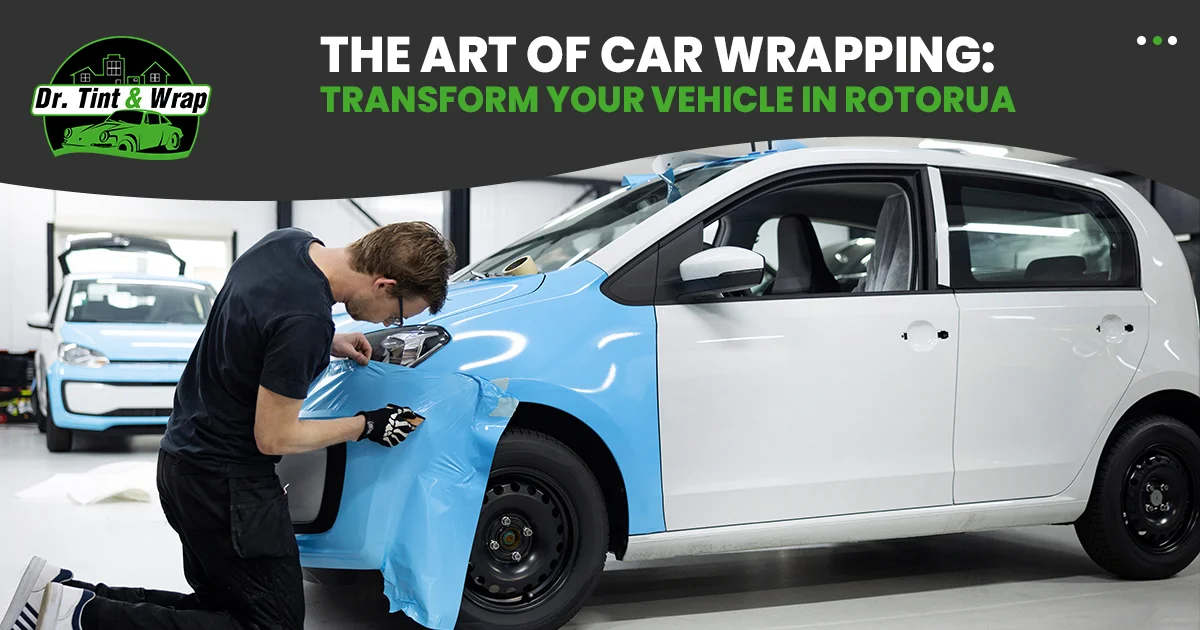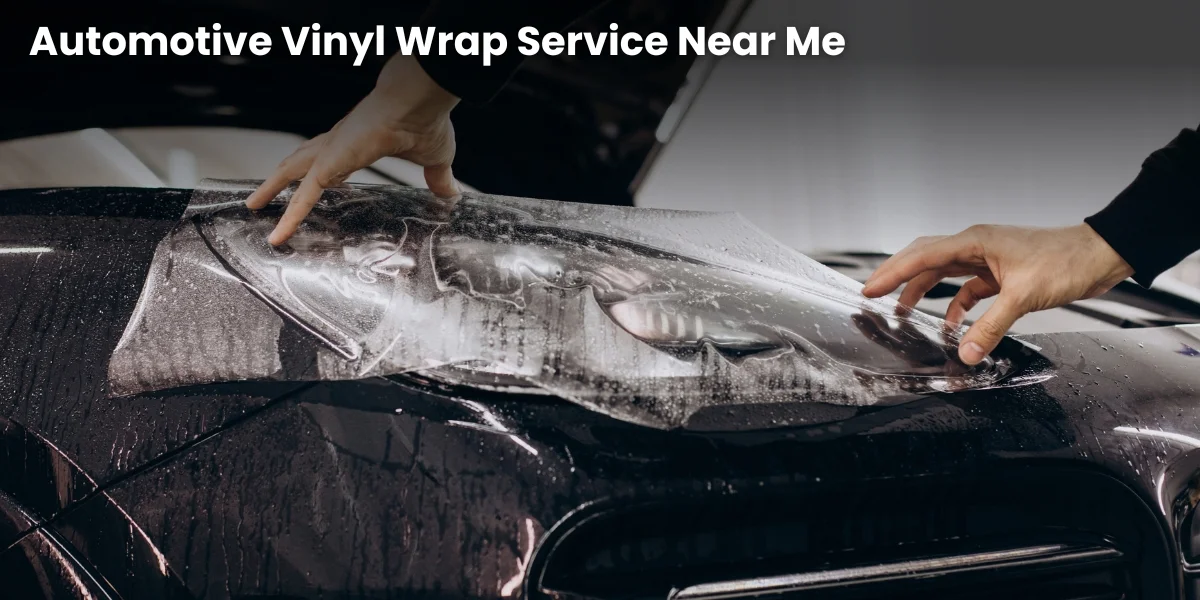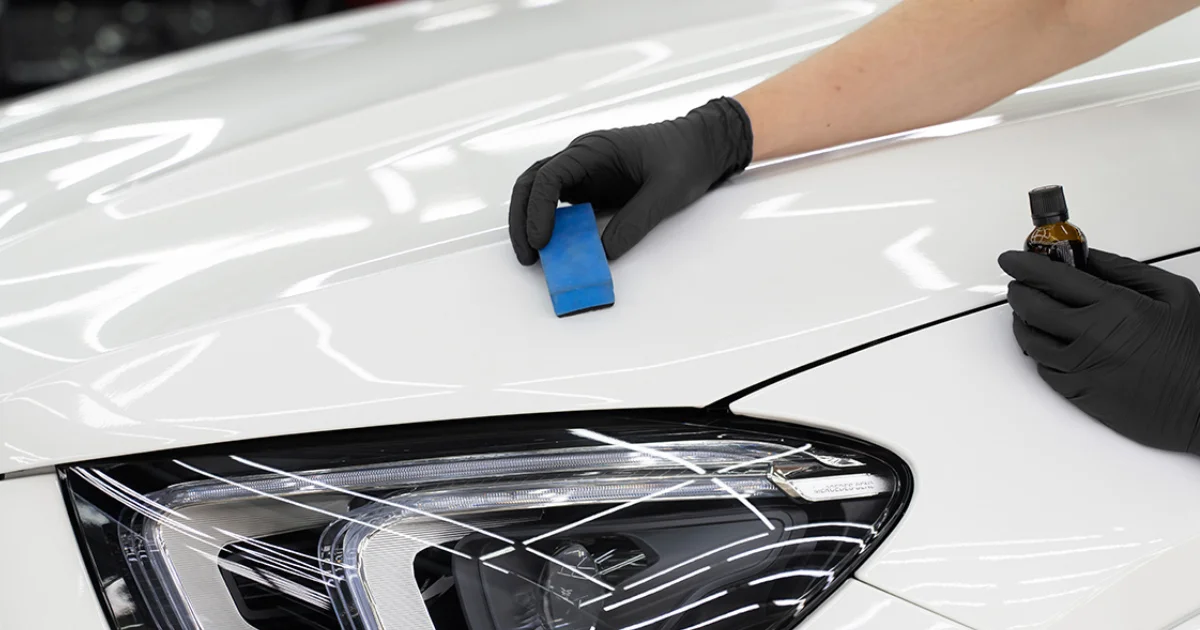
The Ultimate Guide to Car Wrapping: Importance & Tips
25 Apr 2023, By AdminIf you're a car enthusiast looking to give your ride a unique and personalized touch, car wrapping can be an excellent option. Car wrapping is the process of applying a vinyl film onto the surface of a vehicle, completely transforming its appearance. It allows you to change the color, add the finishing, and even add custom graphics or designs to your car, creating a true masterpiece that reflects your style and personality. In this blog post, we will explore the world of car wrapping and how it can elevate your car enthusiast game to the next level.
Importance of Car Wrapping?
Car wrapping has become increasingly popular among car enthusiasts for several compelling reasons,
Customization - Car wrapping allows you to completely transform the appearance of your vehicle. With a wide range of colors, textures, and finishes available, you can create a unique and personalized look that reflects your style and personality. It gives you the opportunity to customize your vehicle without the permanence of a traditional paint job, making it a flexible option for those who like to change up their vehicle's appearance.
Protection - Car wraps provide a layer of protection to your car's original paint. The vinyl material used in car wraps acts as a barrier against minor scratches, chips, and fading from UV rays, helping to preserve the condition of your car's paint and keeping it looking newer for longer. This can be particularly beneficial if you want to maintain your car's resale value or lease a vehicle and want to protect it during the lease period.
Versatility - Car wraps can be used for a variety of purposes beyond just changing the color of your car. They can be used for advertising, business branding, or promoting a cause or event. Car wraps provide a cost-effective and attention-grabbing way to market your business or create awareness for a cause, as they turn your vehicle into a moving billboard that can reach a wide audience.
Reversibility - Unlike traditional paint jobs, car wraps are not permanent and can be easily removed without damaging your car's original paint. This means you can change or remove the wrap whenever you want, allowing for flexibility and versatility in your vehicle's appearance. It also means that if you're planning to sell your car or return a leased vehicle, you can remove the wrap and restore it to its original condition.
Cost-effective - Car wrapping can be a more cost-effective option compared to a traditional paint job, especially for complex designs or multiple color changes. The cost of a car wrap depends on factors such as the size of the vehicle, the type of wrap material used, and the complexity of the design. However, compared to the cost of a full repaint, car wrapping can be more budget-friendly while still providing a high-quality, customizable finish.
Non-permanent - Car wraps are a non-permanent option, which means you can experiment with different looks and styles without committing to a permanent change to your car's appearance. This gives you the freedom to try out different colors, finishes, and designs, and easily revert to the original look if you wish.
Tips for Car Wrapping Enthusiasts
If you're considering car wrapping for your vehicle, here are some tips to keep in mind:
Choose a Professional Installer - Car wrapping is a complex process that requires skill and experience. It's important to choose a professional installer who has a proven track record of quality work. Look for reviews, ask for recommendations, and check their portfolio before making a decision.
Decide on the Type of Wrap - There are different types of car wraps available, including vinyl wraps, color change wraps, and clear wraps. Consider your budget, desired look, and durability requirements when choosing the type of wrap that's best for your car.
Prepare Your Car - Before applying the wrap, make sure your car's surface is clean and free of any dirt, debris, or wax. A clean surface will ensure proper adhesion of the wrap and result in a smooth finish. Also, remove any accessories or trim that may interfere with the wrapping process.
Choose High-Quality Materials - Opt for high-quality vinyl materials for your car wrap. High- quality materials are more durable, resistant to UV rays, and can withstand the elements better, ensuring your wrap will last longer and look better.
Consider Maintenance - Car wraps require regular maintenance to keep them looking their best. Follow the manufacturer's instructions for care and maintenance, which may include avoiding harsh chemicals, hand washing, and avoiding high-pressure car washes.
Be Mindful of Environmental Factors - Extreme temperatures, prolonged exposure to sunlight, and harsh weather conditions can affect the lifespan of your car wrap. Parking your car in shaded areas, using a car cover, and avoiding harsh environmental conditions can help prolong the lifespan of your car wrap.
Avoid DIY Wrapping - Car wrapping is a skilled trade that requires proper training and experience. Attempting to wrap your car yourself without the proper knowledge and tools can result in a subpar finish and damage to your car's paint. It's best to leave car wrapping to the professionals.
Plan for Removal - Car wraps are not permanent and will eventually need to be removed. Plan for the removal process and be prepared for the possibility of minor paint touch-ups after removal. It's important to follow the manufacturer's instructions for proper removal to avoid damaging your car's paint.
Get a Warranty - Look for a professional installer who offers a warranty on their workmanship and the materials used. A warranty can provide you with peace of mind and protection against any potential issues with your car wrap.
Dr. Tint & Wrap is a professional and one of the leading car wrapping service providers in New Zealand. At Dr. Tint & Wrap, we take total care of all the mentioned tips and strictly follow local laws and regulations regarding car wraps, including restrictions on colors, designs, and placement of wraps. Some areas may have specific rules and regulations that need to be followed to avoid any legal issues.

The Art of Car Wrapping: Transform Your Vehicle in Rotorua
25 Apr 2023, By AdminIn the picturesque city of Rotorua, nestled on New Zealand's North Island, there exists a thriving subculture that has taken the automotive world by storm – car wrapping. This innovative and artistic method of vehicle enhancement has become increasingly popular in Rotorua, offering car owners a unique opportunity to express themselves and redefine the aesthetics of their vehicles. Welcome to the world of "Car Wrapping in Rotorua."
What is Car Wrapping?
Car wrapping is an exciting and transformative process that involves applying a specialized vinyl film to the exterior of your vehicle. This vinyl film is meticulously crafted to adhere seamlessly to your car's contours, creating a second skin that can entirely change its appearance. Whether you're looking to refresh your car's look, protect its original paint, or stand out in the crowd, car wrapping in Rotorua can provide the solution you've been seeking.
Why Car Wrapping is Popular in Rotorua
Rotorua, renowned for its stunning natural landscapes, geothermal wonders, and vibrant Maori culture, is also home to a growing community of car enthusiasts and style-conscious individuals. Car wrapping has found a special place in the hearts of Rotorua residents for several compelling reasons:
1. Expressing Individuality: In a city celebrated for its uniqueness, Rotorua residents are embracing car wrapping as a means of expressing their individuality. With a plethora of color options, finishes, and custom designs, car wrapping allows vehicle owners to make a personal statement on the streets of Rotorua.
2. Protection in Rotorua's Climate: Rotorua experiences a mix of climates, from sunny summers to damp winters. Car wrapping offers an added layer of protection against the elements, preserving your car's original paint and finish from the effects of sun, rain, and road debris.
3. Advertisement and Branding: For local businesses in Rotorua, car wrapping has become an innovative advertising tool. Eye-catching vehicle wraps serve as mobile billboards, promoting their services and brands as they travel the city's roads and highways.
.4. Resale Value: Car wrapping is a reversible process, making it an attractive option for those concerned about resale value. When it's time to sell, you can remove the wrap to reveal the well-preserved factory finish beneath.
5. Endless Possibilities: Car wrapping is a versatile art form, limited only by imagination. From sleek matte finishes to striking metallic colors, intricate patterns, and even corporate branding, the possibilities are as diverse as Rotorua's cultural tapestry.
As you delve deeper into the world of "Car Wrapping in Rotorua," you'll discover that it's not just about changing the look of your vehicle; it's about embracing creativity, protecting your investment, and making a statement in a city that celebrates individuality.
In the upcoming articles, we will explore the various facets of car wrapping in Rotorua, from the wide range of design options to the benefits it offers in different seasons. Whether you're a car enthusiast, a business owner, or simply someone seeking a unique way to enhance your vehicle, car wrapping in Rotorua promises an exciting journey of transformation and self-expression. Stay tuned for more insights, tips, and inspirations from the world of car wrapping right here in Rotorua.

Automotive Vinyl Wrap Service Near Me
25 Apr 2023, By AdminTransform your car with Tint a Car – New Zealand’s most trusted name in vinyl wraps and tinting, with over 50 years of experience. We offer professional installations and exclusive products backed by a lifetime nationwide warranty on most films, plus a 30-day money-back guarantee.
What is vinyl car wrapping?
Vinyl car wrapping involves covering your car with high-quality vinyl film, available in a variety of colors, textures, and custom designs. This gives your car a fresh, unique look while also protecting the original paint from damage caused by environmental factors like bird droppings or tree sap.
Why wrap your car?
Wrapping your car is an affordable way to refresh its look while providing a layer of protection. It’s significantly cheaper than a traditional paint job, which can cost anywhere from $1,000 to $10,000. Vinyl wraps start as low as $50 for smaller areas like side mirrors, with larger sections like the bonnet costing around $350. The final price depends on the size of your car and the amount of wrapping needed.
What parts of the car can be wrapped?
From bonnets, roofs, and boots to door handles and racing stripes – we can wrap almost any part of your car. Full wraps are also available for a complete transformation. With a lifespan of 1 to 10 years, vinyl wraps protect your car's original paint from minor chips, weathering, and natural hazards, which can help increase resale value.
Easy to Maintain
Maintaining a vinyl wrap is a breeze—no waxing is required! Just soap and water are enough to keep your car looking clean and sleek. And if you ever want a change, the wrap can be safely removed without affecting the original paint underneath.
Vinyl Wraps for Businesses
Want to promote your business on the go? Vinyl wraps are the perfect solution. Provide us with your design, and we’ll turn your vehicle into a mobile billboard.
Elevate your car’s look and protection with Tint a Car – the experts in vinyl wrapping and tinting in New Zealand.

Is Car Ceramic Coating Worth the Hype?
25 Apr 2023, By AdminWe wish our cars always looked as good as new after years of use! But, no. It doesn’t work like that. After a few years, fading paint, scratches, scuff marks, and corrosion deteriorate the original color and sheen of the paintwork. Is there a way to protect your car’s appearance? Of course! We live in an era of innovation and advancements where the automotive industry has undergone revolutionary changes, and engineers have discovered an incredible way to safeguard a car’s exterior.
Among diverse paint protection methods, car ceramic coating has acclaimed immense popularity across the globe. You may have even spotted cars with ceramic coatings but never recognized them. A ceramic coating proposes a seamless finish and is an excellent option to protect your car’s paintwork.
For all the newbies unaware of ceramic coatings, this blog is the ideal guide to answering your questions. You will learn everything you need to know about this wonder product.
Car Ceramic Coating: An Introduction
Car ceramic coating is made of liquid polymer that chemically interacts with the car’s original paintwork to form a protective layer. It provides semi-permanent to permanent protection. Unlike other car protection films, ceramic coating is not applied on the surface level but on a molecular level. Therefore, it furnishes optimal protection and efficiency.
While wax coating offers only temporary shine and waterproof qualities,ceramic coating is much more durable and resistant to dust and water. When applied, car ceramic coating bonds with the car’s paint, filling in pores and scratches. As it cures, you get a hard and sturdy coating that enhances the longevity of your car’s paint.
Generally, the coating consists of silicon dioxide, which is naturally derived from sand and quartz. Often, titanium dioxide is added to boost the coating’s efficiency.
Now, why do car owners prefer ceramic coating over wax or other coatings? Let’s discuss it in the next section.
The Many Benefits of Car Ceramic Coating
Car lovers are going gaga over ceramic coating, and we have many reasons for that!
- Enhanced Protection: As we said, if you want to protect your car’s paintwork, the ceramic coating does the job exceptionally well! Since it forms a hard layer over the car’s surface, you can expect enhanced paint protection against various elements. No more scratches, fading paint or bird-dropping spots!
- Dust and Water-Resistant: Imagine driving through a dirt track only to see your car has turned into a dirt magnet! You have to thoroughly clean your car to get rid of the mess. However, with car detailing Tauranga, you no longer have to worry about dirt sticking to the surface. Also, you are safe against corrosion because your car’s exterior is now waterproof!
- Promotes Paint Life: Obviously, with the additional protection, your car’s paint will last much longer while retaining its color and gloss. You have better paint protection now from UV rays, stone chips, scuff marks, etc.
- Corrosion Prevention: Cars are prone to corrosion due to water and other liquid spills. Even heavy rain can cause considerable damage to the paint when not maintained properly.
- UV Protection: Who knew cars could be protected from harmful UV rays until the emergence of ceramic coatings? These polymer components act as a barrier against the harmful impact of UV rays that can considerably fade away the car’s paintwork. It also keeps the car’s interior cool and comfortable.
- Easy Maintenance: Since car ceramic coating is hydrophobic, it requires less maintenance. It is easy to clean, and your car remains spotless for years.
Ceramic coating cost varies depending on the quality, durability, andcoverage. Nonetheless, it is an effective way to enhance your car’s aesthetics and safeguard it from surface damage.
